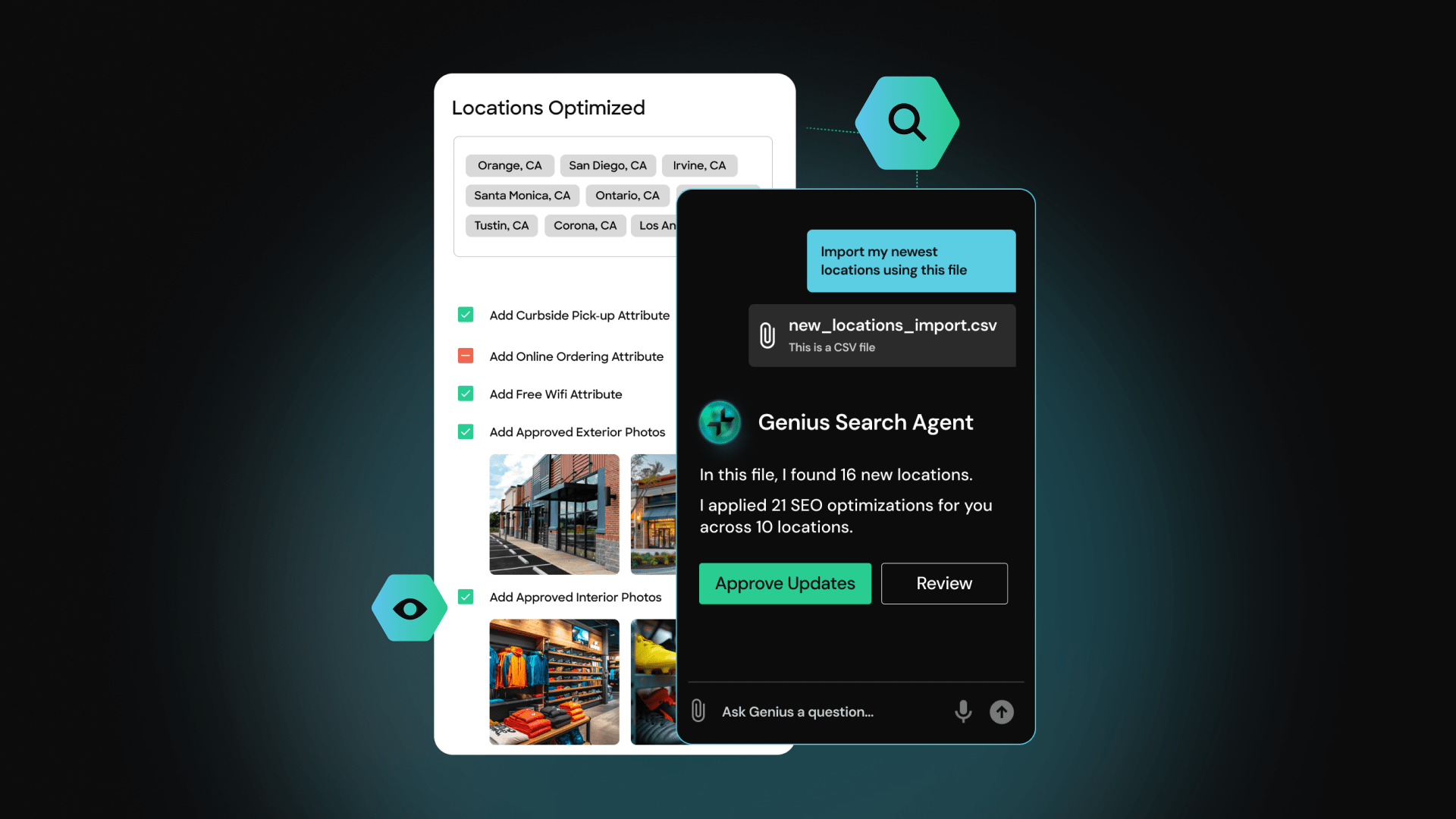Why Apartment Reputation Management Matters + 5 Strategies to Drive Leases
Reputation drives results in multifamily marketing. Our own research has found that 91% of renters use reviews to evaluate communities, and more than half of them said they’re more likely to choose one that responds to its reviews. Your online presence has a direct line to occupancy, impacting both interest and conversion.
Search is the first stop for today’s renters. AI-generated summaries increasingly pull in star ratings, comments, and responses before anyone lands on your site. That means what’s said, and how you handle it, can make or break the leasing experience.
In this article, we’ll break down what apartment reputation management really means and share five practical strategies to help your team improve ratings, expand reach, and convert more leads into leases.
What is apartment reputation management?
Apartment reputation management means actively monitoring, engaging with, and acting on what residents and prospects say on review sites, social platforms, and search results. It’s about real-time response and brand consistency at scale.
For multi-site property teams, this isn’t a nice-to-have. It’s a core operational function. Every rating, comment, and mention contributes to your digital footprint. And that footprint is now a deciding factor for prospective renters.
Reputation management at scale requires a centralized platform. One that gives corporate, regional, and on-site teams a shared view of public sentiment, response times, and where to focus attention next.
Reputation management software like SOCi Genius supports every level of your organization. Leasing teams can engage with feedback using pre-approved, AI-drafted replies. Marketing teams monitor sentiment trends and uncover performance insights. Regional and corporate leaders use dashboards to track risk and uncover which communities need hands-on support before poor feedback impacts leasing outcomes.
Why online reputation directly impacts occupancy
Reviews and reputation not only affect potential renters who find your listings. Search performance is also at stake. Google looks at review recency, quantity, and response cadence when determining local rankings. AI-generated summaries are surfacing those signals first, pulling your reputation into instant, high-stakes snapshots.
Strong ratings, consistent follow-through, and active engagement don’t just build trust. They build occupancy.
5 impactful apartment review-management strategies
Managing your reputation isn’t a one-time effort or a monthly task. It’s a daily operational priority. Each comment or rating influences whether a prospective renter books a tour or looks elsewhere. The strategies below are designed to help you improve how your communities are perceived and strengthen engagement at scale.
1. Track reviews and social mentions across every channel
Your digital reputation lives in more places than your Google Business Profile. Renters leave feedback on Apartments.com, Yelp, Facebook, and increasingly on platforms like TikTok and Reddit.
In fact, 73% of consumers now discover brands on social media, and Gen Z consults an average of 3.6 platforms before making a decision. Monitoring each channel gives you a more complete view of how your properties are represented online.
Real-time alerts matter. Missing a single post, whether a rave or a complaint, means missing a chance to correct an issue or reinforce a positive experience.
With SOCi Genius Reviews, property teams can view all incoming feedback from one unified inbox. Built-in AI sentiment tagging helps uncover trends and recurring themes that shape how your communities are perceived in search and affect lead-to-lease performance.
Prompt engagement helps improve your discoverability in local search. Frequent, timely responses will get you increased exposure in local rankings on platforms like Google.
2. Respond to positive and negative feedback (compliantly)
Every piece of feedback deserves attention. Whether the message is a glowing or critical review, how your team engages with it reflects the professionalism and reliability of your onsite managers. In fact, 65% of consumers are more likely to choose a business that responds to reviews.
Use this four-step framework to respond:
- Acknowledge the comment
- Empathize with the experience
- Resolve if needed
- Invite a follow-up outside the public channel
The FTC has made expectations clear: no fake ratings, no undisclosed incentives, and no hiding critical feedback. That means every reply needs to be genuine, traceable, and legally compliant.
SOCi Genius Reviews helps teams address feedback quickly, using AI-generated reply suggestions tailored to tone and context. It also flags potential compliance risks and records all activity for transparency and accountability.
3. Maintain a consistent voice
Once you’ve built a consistent response process, the next step is identifying your strategy for tone of voice. Do you intend to respond to all reviews with the same tone, or does each property have its own brand voice?
Prospects scanning reviews for a community should encounter a unified voice. Whether the review is positive or negative, the level of professionalism, tone, and clarity should feel aligned.
Start with:
- Pre-approved response templates
- Brand-aligned language guides
- Clear communication principles for on-site and regional staff
This consistency does more than reinforce your reputation—it helps your team avoid compliance risks. Generic or unclear language can quickly cross fair housing boundaries or confuse prospective renters.
When patterns emerge, like repeat mentions of delayed maintenance or noisy neighbors, SOCi’s sentiment heat maps and AI keyword clustering surface those trends at scale. Regional teams can then pinpoint which communities need operational support before issues affect occupancy.
Feedback is a valuable data source. Use it to drive service improvements, not just damage control.
4. Ask for feedback from satisfied residents (FTC-safe)
Positive experiences don’t always turn into online praise. Most happy renters need a gentle nudge.
Send review requests at key touchpoints:
- Move-in day
- After maintenance is completed
- Lease renewal
Keep it simple. SMS or email messages with a direct link to your preferred review site are ideal. If any incentive is involved, such as a small giveaway or contest entry, it must be disclosed to stay FTC compliant.
Resident surveys can also be helpful. They can gather more detailed feedback, identify silent churn risks, and strengthen the resident relationship beyond public platforms.
The more consistent your feedback stream, the stronger your resident-facing presence. Platforms like Google and Apartments.com prioritize communities with fresh, detailed input, including amenity mentions, location context, and service recognition.
As your volume of feedback grows, managing it consistently across teams becomes more complex and critical. Reputation management software like SOCi Genius Reviews automates this process across communities, so satisfied residents are more likely to speak up and strengthen your property’s discoverability.
5. Invest in software that scales with your portfolio
As your property count grows, spreadsheets and one-off logins become impossible to manage. Reputation software should help teams coordinate efforts, monitor patterns, and follow up faster, without the manual lift.
Look for tools that offer:
- Multi-site aggregation in a single dashboard
- AI-powered sentiment tracking to surface key trends
- Role-based access so that on-site and corporate teams see what’s relevant
- Smart reply suggestions to reduce follow-up time
- Audit trails to support FTC compliance and brand governance
Importantly, the platform should integrate with your existing tools, such as CRMs, property management systems, and communications platforms, so that users don’t have to toggle between tabs or re-enter data.
The best solutions go beyond basic monitoring. Tools like SOCi Genius combine AI-driven insights, smart automation, and role-based dashboards in one place. They integrate directly with your CRM and property management systems to streamline work across teams. With built-in compliance tracking and a centralized audit trail, they support legal, marketing, and operational needs.
Real-world impact happens when strategy meets execution. Here’s how one property management team put it into practice.
Bringing it all together with SOCi Genius
Effective reputation management takes more than a handful of replies and a few good reviews. It requires aligned systems, actionable data, and tools built for large-scale teams.
That’s exactly how Sandhurst Apartment Management strengthened its online presence across its multifamily portfolio.
Using SOCi Genius Reviews, Sandhurst:
- Achieved a 97% review response rate
- Increased reviews by 19% across all properties
- Reduced follow-up time from staff by 25%
Together, these changes led to more consistent engagement, stronger local reputation, and real improvements in leasing outcomes.
AI-drafted messages helped on-site teams engage faster. Centralized dashboards gave regional leaders insight into which properties needed extra attention. Everyone worked from the same source of truth.
The impact was clear: better consistency, stronger trust, and a brand presence that performed across every touchpoint.
With traditional search traffic down 10% and discovery happening across multiple platforms and AI tools, centralizing your feedback channels is more important than ever. Whether you manage 10 properties or 500, SOCi Genius gives you the framework to scale reputation success and turn feedback into real operational wins.
Learn more: Multifamily Marketing in 2025: Retain Residents through Social Engagement and Reputation Management









